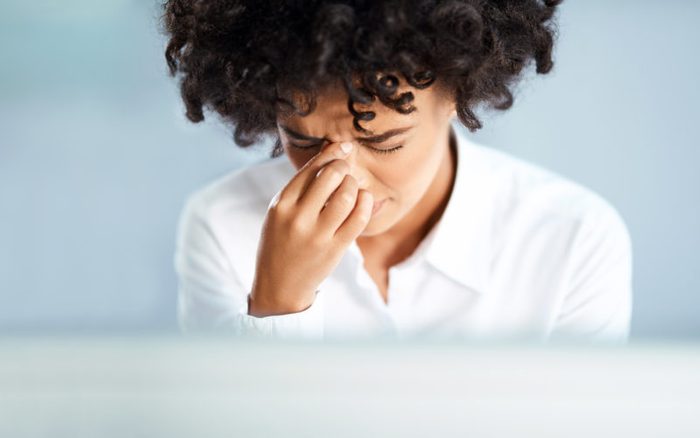
Are you making your stress worse?
Whether you’re male or female, red state or blue state, stress seems to be the one thing that unites us all. While there are proven ways to reduce mental, physical, and emotional stress, some do more harm than good. And what works for you might not work for your neighbor. “Coping with stress is like good fashion,” says James Rodriguez, PhD, director of Trauma-Informed Services at the NYU McSilver Institute. “One size fits all doesn’t always work.” Everyone has their unique way of coping. Here are some that science says may be contributing to your stress level.

Unwinding with TV
After a long, stressful day, being a couch potato with TV or video games is supposed to help you relax, right? Not for everyone. Studies have found that people who were exhausted after work were more likely to feel guilty—that the TV and games made them procrastinate instead of accomplishing more important tasks. Screen time can also make existing stress worse. A 2019 study in PlosOne found that high TV viewing levels may be linked with ineffective coping strategies or social isolation, both of which increase stress levels and even the risk of developing stress-related disorders.

Thinking it over
Maybe you replay a meeting with your boss over and over in your mind, or make an endless pro and con list. These practices sound productive, but they may lead to a sabotaging habit that psychologists call ruminating—or compulsively thinking about something. Rumination isn’t inherently bad, says Dr. Rodriguez. “The problem occurs when one stressful thought (“I can get sick”) leads to another thought (“I can die”), or another (“Even if I don’t get sick, I could lose my job”), and so on without a move towards problem-solving.” It gets even more complicated when rumination turns into negative self-evaluations, such as, “things will never work out for me.” All of these behaviors can prolong the effects of psychological stress, according to 2018 research published in Anxiety, Stress, and Coping. If you can’t easily escape your stress mentally or turn off the self-defeating thoughts in your head, distract yourself with physical exercise or upbeat music. Using distraction can be really helpful in the short term, but that it is best if it continues to be a problem to consider therapy as well. Learn how rumination and obsessive thinking are linked to anxiety and depression.

Ignoring it
On the other end of the attention spectrum, completely ignoring whatever is stressing you out is not in your best interest either. Attempting to put it out of your mind won’t make the stress go away. On the contrary, you’ll only make the stress worse. Allow yourself to confront the problem, no matter how uncomfortable that may be, and develop a plan of action to find a solution. If it still seems like too big a task, enlist the help of someone you trust or a counselor.

Talking with friends
When pals discuss their problems, they can experience negative consequences, especially if the conversation becomes gossipy, leads to competition, and involves third-parties, according to 2019 research published in Frontiers of Psychology. Instead, experts recommend talking about a problem once, then shifting your focus to possible solutions.

Going it alone
While you want to avoid stressful relationships, isolating yourself can also have negative consequences, says Rodriguez. “We are social beings and staying connected to others is critical,” he says. This, of course, is one of the major challenges of this time, due to social distancing. That’s why reaching out to people who are most supportive and dear to you by phone, text, FaceTime, Zoom, email, or whatever technology works for you, can be reassuring. Plus, here’s how to keep loneliness and isolation from harming your health.

Multitasking
Trying to do too much at once can increase your stress levels and make your brain slow down, and—here’s the key—most people are much better at doing one thing at time, according to a 2019 report in the medical journal Cerebrum. It’s better and less stressful to focus and get the job done right. (Here are more causes of stress you didn’t know you had.)

Sleeping more
Most of us could admittedly use more zzzs, but spending too much time in bed can make you lethargic, slow down your metabolism, and even increase your risk for dementia, according to the National Sleep Foundation. Most people need between seven to nine hours a night, but you may need a little more or less sleep to keep stress in check and feel your best.

Eating comfort food
Digging into the mac-and-cheese or grabbing a jumbo Snickers isn’t a healthy way to combat stress, but many of us continue to do it, aiming for a quick mood boost or energy lift. But when you scarf down food and your stress hormones are raging, these chemicals can actually tamper with digestion. Unfortunately, the calories you eat then are more likely to be stored as fat than used for energy. Instead, opt for one of the 14 best foods to eat when you’re stressed. And learn how to get a handle on emotional eating.

Drinking alcohol
You’ve probably indulged in a glass of pinot noir or chardonnay after a rough day at the office, which isn’t a big deal—unless that one glass turns into three or more. (Or you find yourself drinking more days than not.) According to the National Institute on Alcohol Abuse and Alcoholism, men and women who report high levels of stress tend to drink more, and men are more likely to turn to alcohol for stress relief than women. Additionally, heavy drinking—defined as binge drinking (having four drinks for women and five drinks for men in around two hours) on five or more days in a month—can impact how our bodies react to stress. If you are drinking 15 or more standard drinks per week for a man and 8 or more drinks per week for a woman would be concerning, as would having 4 or more in one sitting for a woman, and 5 or more for a man in one sitting. A heavy drinker will likely experience more anxiety over stressful situations than someone who drinks moderately. And drinking makes treating things like anxiety and depression harder.

Hanging out on social media
It’s a habitual reward for many: Turn in a work project or finish a task around the house, spend 10 minutes scrolling the social media site to relax. But if your friends gravitate toward complain-y, negative-type posts, their outlook may make your own stressed-out feelings worse. Other research in the American Journal of Health Behavior finds that the association between social media use and stress may be more personal; in other words, your mood may affect how you feel about what you see rather than the content itself. “Negative images also can lead to negative emotions, such as sadness, frustration, anger, and anxiety,” says Rodriquez. “People may react differently to the same images, but the effect will be some form of stress response triggered by negative emotions.” So be careful not to go on social when you’re feeling blue. And if your Facebook friends tend to share happy, uplifting news, checking your feed could help lift your mood, too. Next, check out the stress “facts” you should stop falling for.
